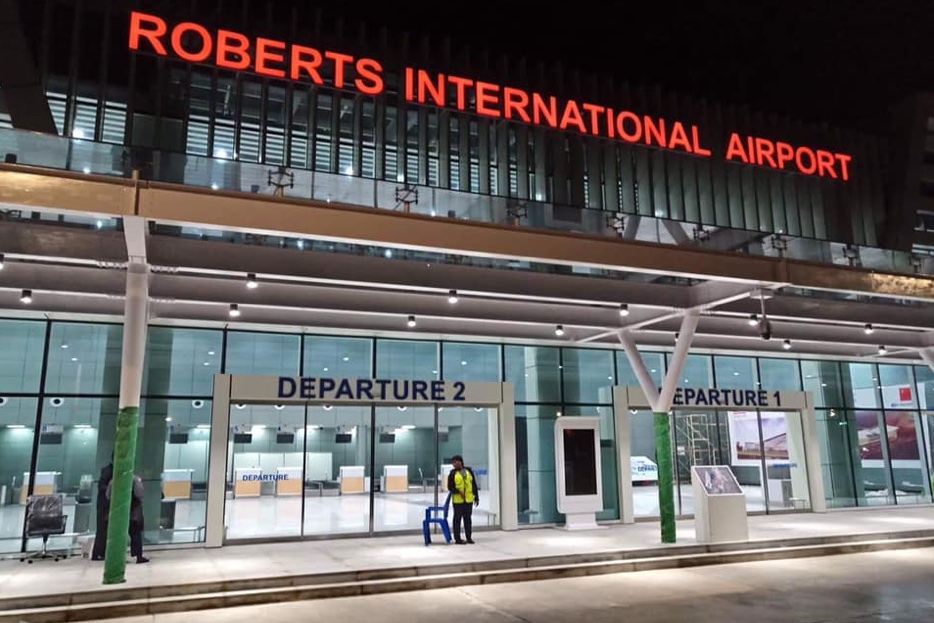
By Jusu Gow
Urgently needed: A team of aviation business management (ABM), safety, and operations professionals!
With the recent announcement of Brussels airlines to suspend flights to Liberia due especially to the lack of adequate navigational aids (NAVAIDs) to support the critical instrument landing system (ILS), it is important that the RIA management and concerned authorities invest heavily in the acquisition of those needed equipment. However, purchasing the required NAVAIDs is one thing, maintaining it is another thing altogether. It is now evident that RIA has a lot of work to be done and hiring a managing director alone may be necessary. Moreover, hiring a team of specialized aviation professionals will be sufficient to give the airport the lift it needs to be on par with other regional airports and in compliance with the International Civil Aviation Organization (ICAO).
Aviation business management (ABM) professionals understand how to generate revenue from existing airport space and land. They also understand human resources (HR) and the human capacity required to achieve optimum service delivery at the airport. Airport space especially terminal space can be a huge source of revenue. Unlike many decades ago when airport terminals serve the purpose of arrivals and departures, modern airport terminals have now become a big business arena somewhat synonymous to a shopping mall. With this reality the team of ABM professionals could lease terminal space to various concessionaires to optimize revenue. They can have concessions with Liberian and international based businesses to diversify the traveling consumers’ options.
Prior to the onset of the Liberian civil war and up to the mid-80s the iconic American airline Pan AM did manage the entire RIA under a concession with the Liberian government. The ABM could look into the possibility of similar concession say with their longstanding partner Brussels Airlines (SN) and SN could sublease to other companies. As long as revenue is generated enough to cover operational, managerial and maintenance expenses of the airport, such concessions could be something RIA may consider moving forward. The ABM team should also emphasize the HR need of the airport. In order to continually achieve optimum service delivery, employees have to be consistently trained especially in line with best practices in the aviation industry. Trainers have to be hired and training packages that reflect good customer service and safety have to be developed.
The ABM team could also generate revenue from existing land space for such concession agreement with fixed-based operators (FBOs), freight handling, tie- down, hangars, rental cars and other aviation related businesses on the airport premises. The goal is to make RIA revenue independent since most airports are self-funded and autonomous.
Now let us talk about operations and safety:
Operations and safety work hand-in-hand with the daily running of an airport, but for the case of RIA I will suggest having each streamlined to specific duties. In this case the operations team will be tasked with the oversight responsibility of running the terminal. From the general public view the terminal is a place to wait for or disembark from a flight, but from the aviation standpoint the terminal is more than a waiting space. The terminal is a place of very high traffic which in itself is a security structure that serves as a barrier between landside and airside. There are certain areas of the terminal that are off limits to the traveling public and can only be accessed by authorized personnel; therefore, it is the duty of the operations team to ensure that those areas remain “sterile” at all times. It is also the duty of the operations team to ensure that airport tenants are adhering to the security rules as written within their contracts. Operations will also be responsible for terminal maintenance and power (electricity/fuel).
In the United States the Transportation Security Administration (TSA) and the local city work together to enhance the overall security of the airport under federal code 49 CFR 1542 (Airport Security). As part of its functions, the TSA screens the traveling public to prevent unauthorized items in the terminal area and on the aircraft. The TSA also ensures that jetway doors are only accessed by authorized personnel and in case of a security breach or an unattended bag situation, both the city representatives and the TSA liaise with the local police department to provide extra line of screening and security which in some cases prompt a lockdown and the use of K9s. The RIA operations team can perform in the same way to ensure the terminal is always secured.
I am discussing safety here is in the context of everything that needs to be done on the airside to keep flight operations running seamlessly. RIA will only continue to generate revenues when there are non-stop flight activities. When NAVAIDs are purchased and installed with millions of United States Dollars, it is important that the safety team ensure those equipment are maintained through inspections at various times of the day to ensure it is working properly. Trained technicians need to be hired to address any malfunctioning of those NAVAIDs in a timely manner. What RIA does not want is a continuous repeat of what happened to Brussels Airlines recently or that of what happened in April this year when the aircraft had to abort landing and was rerouted to Sierra Leone due to poor runway lighting.
The safety team will continually observe and fix any issues with the NAVAIDs and in the case of a technical glitch, RIA can timely issue notices to air missions (NOTAMs) for scheduled inbound traffic. In my opinion it is better to have a delayed or cancelled flight than for an aircraft on an initial approach to find out that the glideslope is malfunctioning or PAPI is not calibrated to the right angle due to it being struck by wildlife.
In addition to revenue and safety, running an airport is all about good public relations (PR); therefore, a cancelled or delayed flight does not affect an airport image compared to a widely disseminated problem of malfunctioning NAVAIDs and a group of passengers (and their loved ones) who are angry and take to social media because they were inconveniently flown to another country as a result of poor runway lighting at their airport of destination.
With all that has happened recently, RIA needs to be on top of her game; therefore, the management does not have to only address existing problems, but need to make sure that other problems do not come into existence.
In this light, the safety team will also need to keep up with other airside safety indicators such as having a functional aircraft rescue and firefighting (ARFF), maintaining vegetation (especially grass) at a required level, wildlife management, fixing runway potholes, ensuring apron, runway and taxiway markings are visible, making sure airport fencing is intact.
Best safety practices stipulated within the United States Federal airport certification regulations, 14 CFR Part 139 (Airport Certification) could serve as a guide to establish or enhance the airside safety indicators I have listed above.
RIA may already be doing some of what I have suggested here, but they could optimize on existing projects and become creative with new ideas aimed generating more revenues and enhancing safety. RIA needs to understand that optics is everything and it does not benefit management (and the government) that “bad news” is always coming out of Liberia’s lone international airport.
My suggestions here are not exhaustive of the functions of the three recommended teams; however, it could serve as a point of reference to address the gravity of needs RIA is currently faced with and a way forward to get it moving again.
Jusu Gow
Master of Science in Aeronautics (MSA)
Embry Riddle Aeronautical University
jgowus@yahoo.com




















india pharmacy mail order https://indiaph24.store/# indian pharmacy paypal
Online medicine order
Thank you for consistently producing such high-quality content.
terbinafine 250mg for sale – buy forcan without a prescription grifulvin v usa
lamisil medication – purchase griseofulvin online cheap buy grifulvin v pills
cost semaglutide 14mg – buy glucovance pills order desmopressin for sale
order rybelsus 14 mg – rybelsus usa order generic DDAVP
Thank you for adding value to the conversation with your insights.
This post is a testament to your expertise and hard work. Thank you!
repaglinide 2mg price – buy prandin 2mg generic buy generic jardiance
order metformin 1000mg online – sitagliptin for sale order acarbose 50mg sale
I’m so glad I stumbled upon this article. It was exactly what I needed to enjoy reading!
I’m genuinely impressed by the depth of your analysis. Great work!
micronase pills – purchase glipizide without prescription buy dapagliflozin 10 mg generic
order glyburide 5mg for sale – pioglitazone 30mg price order dapagliflozin 10mg generic
order clarinex 5mg generic – beclamethasone order albuterol tablet
A masterpiece of writing! You’ve covered all bases with elegance.
desloratadine canada – purchase beclamethasone sale purchase ventolin online
medrol 4 mg tablets – buy fluorometholone without prescription order astelin
medrol 4mg pills – buy montelukast 10mg sale order azelastine 10 ml sprayer
buy ventolin medication – fluticasone canada buy generic theophylline
The dedication to high quality content is evident and incredibly appealing. It’s hard not to admire someone who cares so much.
order albuterol without prescription – albuterol inhalator canada theo-24 Cr price
order stromectol – eryc drug purchase cefaclor online
The work is both informative and thought-provoking. I’m really impressed by the high quality of The content.
ivermectina online – buy cheap doryx cefaclor 500mg canada
Your post resonated with me on many levels. Thank you for writing it!
I’m in awe of the way you handle topics with both grace and authority.
I admire the way you tackled this complex issue. Very enlightening!
order cleocin generic – chloromycetin oral chloromycetin cheap
I’m impressed by your ability to convey such nuanced ideas with clarity.
buy clindamycin pills for sale – cefpodoxime over the counter cheap chloramphenicol online
cost azithromycin 500mg – oral floxin buy generic ciprofloxacin for sale
zithromax 250mg cheap – purchase tindamax order ciplox for sale
buy generic amoxil for sale – order cefadroxil 250mg for sale ciprofloxacin 500mg for sale
amoxicillin uk – trimox 250mg sale baycip price
purchase amoxiclav generic – buy generic acillin over the counter purchase baycip sale
buy augmentin 375mg pills – zyvox online order purchase ciprofloxacin online
hydroxyzine 10mg pills – nortriptyline 25mg price purchase endep for sale
order atarax 10mg generic – endep 10mg sale order endep 10mg
Your work is truly inspirational. I appreciate the depth you bring to your topics.
order generic anafranil 50mg – duloxetine 20mg for sale doxepin 25mg generic
clomipramine 25mg generic – buy citalopram 40mg generic purchase sinequan generic
seroquel 100mg uk – purchase zoloft pill buy generic eskalith for sale
purchase quetiapine for sale – where can i buy bupropion order eskalith online
I admire the way you tackled this complex issue. Very enlightening!
buy clozaril 50mg generic – purchase glimepiride for sale pepcid 20mg generic
clozaril 100mg ca – order frumil 5mg generic order famotidine
zidovudine 300mg pills – glycomet cost order generic zyloprim 300mg
retrovir 300mg brand – buy zyloprim 100mg generic
purchase metformin pills – metformin 1000mg pill lincocin 500 mg usa
glucophage 500mg oral – lincocin over the counter lincocin online
Your post was a beacon of knowledge. Thank you for illuminating this subject.
lasix ca – captopril for sale generic capoten 120mg
order lasix 40mg pills – buy generic prazosin 2mg capoten 25 mg usa
You’ve opened my eyes to new perspectives. Thank you for the enlightenment!
flagyl 200mg tablet – buy cefaclor 250mg pill azithromycin medication
purchase metronidazole sale – where to buy terramycin without a prescription buy generic zithromax online
ampicillin for sale online buy ampicillin medication amoxicillin tablets
ampicillin online buy purchase penicillin generic how to get amoxicillin without a prescription
order valacyclovir for sale – buy diltiazem 180mg buy acyclovir online cheap
purchase valacyclovir without prescription – buy nemasole pill order acyclovir pill
stromectol human – buy ciprofloxacin 500 mg for sale buy sumycin 500mg generic
buy ivermectin usa – sumycin oral purchase sumycin sale
metronidazole 200mg cheap – cefaclor 250mg canada buy zithromax generic
flagyl 400mg cheap – purchase cleocin without prescription azithromycin uk
brand ciplox 500mg – ciplox over the counter erythromycin generic
cost ciprofloxacin – ciprofloxacin 500 mg tablet order erythromycin 250mg pills
buy ciprofloxacin paypal – order cephalexin 125mg online cheap purchase amoxiclav generic
where can i buy cipro – buy augmentin generic augmentin 625mg price
brand ciprofloxacin – where can i buy cipro order amoxiclav pill
order ciprofloxacin 500mg generic – septra without prescription buy clavulanate online cheap
finpecia pills purchase fluconazole online cheap order diflucan for sale
buy finasteride tablets order diflucan 200mg without prescription buy generic fluconazole
buy ampicillin paypal buy ampicillin generic order amoxicillin sale
ampicillin buy online purchase amoxil sale amoxil usa
purchase zocor pill purchase simvastatin for sale valacyclovir 1000mg drug
avodart 0.5mg cheap ranitidine pills where can i buy zantac
order simvastatin 10mg for sale zocor 20mg ca cheap valtrex
avodart pills buy zantac 150mg oral ranitidine 150mg
buy ondansetron 8mg sale buy generic aldactone 100mg order aldactone 25mg for sale
order sumatriptan 25mg pills levaquin 500mg over the counter buy generic levofloxacin
buy imitrex generic levaquin 500mg cost brand levofloxacin 500mg
ondansetron 8mg brand zofran generic purchase aldactone pill
flomax pills buy generic flomax over the counter order celebrex 100mg without prescription
flomax 0.4mg canada celecoxib 200mg us celecoxib 200mg cheap
order nexium 20mg nexium drug buy topamax pills for sale
order generic esomeprazole 20mg order topamax 200mg generic order generic topiramate 100mg
order meloxicam online purchase mobic purchase celecoxib generic
order reglan without prescription cozaar online hyzaar over the counter
order metoclopramide 20mg online order metoclopramide 20mg online cheap buy cozaar 25mg pills
buy meloxicam 15mg online purchase celebrex for sale celecoxib 100mg pills
buy generic methotrexate methotrexate 2.5mg for sale coumadin online
cheap paper writing services write my thesis good academic writing
buy methotrexate 2.5mg online warfarin 2mg canada warfarin ca
pay for essay writing uk buy essay now purchase essay online
inderal 20mg uk plavix 150mg price plavix 150mg for sale
buy cheap inderal brand inderal 10mg order clopidogrel 150mg online
methylprednisolone 16 mg tablets buy medrol 16mg methylprednisolone over the counter
methylprednisolone 16mg without prescription methylprednisolone oral buy medrol 8mg
atenolol 50mg ca order atenolol generic atenolol 50mg uk
tenormin 50mg generic buy tenormin 100mg sale order tenormin 50mg for sale
toradol generic colchicine cost colcrys uk
ketorolac where to buy ketorolac pill where can i buy colchicine
generic lopressor order lopressor online metoprolol cost
lopressor brand buy lopressor order lopressor 100mg online cheap
order flexeril online order flexeril pill lioresal buy online
buy cyclobenzaprine generic buy cheap generic flexeril cost baclofen 10mg
order prilosec without prescription omeprazole 20mg pills omeprazole cheap
oral omeprazole 20mg order omeprazole 20mg online cheap buy omeprazole 20mg sale
order domperidone generic purchase domperidone generic how to get tetracycline without a prescription
domperidone for sale sumycin 500mg pill buy tetracycline pill
buy cheap lisinopril purchase lisinopril online cheap how to buy lisinopril
order lisinopril generic order zestril 2.5mg generic prinivil
order crestor 10mg pills buy ezetimibe sale zetia price
brand rosuvastatin crestor pills buy ezetimibe pill
order generic amlodipine 10mg order amlodipine 10mg without prescription amlodipine pills
buy norvasc generic order norvasc sale amlodipine without prescription
buy generic acyclovir 800mg buy allopurinol cheap allopurinol 100mg cost
cheap zovirax buy zyloprim 300mg generic zyloprim over the counter
buy lipitor pills for sale order atorvastatin 20mg online cheap order lipitor 10mg for sale
glucophage oral buy cheap glucophage buy glucophage 500mg generic
order orlistat 120mg for sale order diltiazem online cheap order diltiazem 180mg for sale
purchase orlistat diltiazem 180mg pills diltiazem price
buy metformin generic buy glycomet 500mg generic glucophage 500mg sale
chloroquine oral buy cheap generic aralen chloroquine 250mg cost
order dapoxetine 90mg without prescription order priligy 90mg generic purchase cytotec online
where to buy priligy without a prescription cytotec over the counter misoprostol 200mcg canada
buy chloroquine cheap where can i buy chloroquine buy aralen no prescription
cenforce 50mg pills cheap cenforce 100mg cenforce 50mg uk
claritin buy online buy claritin no prescription oral loratadine 10mg
order loratadine generic loratadine cost claritin usa
order cenforce 50mg generic order cenforce 50mg online cheap cenforce order online
buy tadalafil pills buy cialis sale cialis 40mg price
buy desloratadine 5mg generic brand desloratadine 5mg clarinex cost
desloratadine 5mg over the counter order desloratadine 5mg generic buy desloratadine without prescription
cialis cost cialis buy online buy generic tadalafil
order hydroxychloroquine 200mg pill order plaquenil pills hydroxychloroquine pills
triamcinolone 4mg pills aristocort pills order triamcinolone online
aristocort 4mg oral order triamcinolone online cheap aristocort 10mg over the counter
buy levitra without a prescription where can i buy vardenafil cost levitra 10mg
order lyrica 150mg pill lyrica without prescription order lyrica online
that roulette best online casino games quick hits free online slots
generic semaglutide 14mg buy rybelsus paypal order rybelsus 14mg
online gambling games online casino for real cash best casinos
order semaglutide generic order rybelsus buy generic semaglutide over the counter
Thanks a bunch for sharing this with all of us you really know what you are talking about! Bookmarked. Please also visit my web site =). We could have a link exchange contract between us!
order doxycycline 100mg generic purchase doxycycline without prescription doxycycline 200mg without prescription
doxycycline 100mg us order doxycycline 200mg without prescription buy doxycycline 200mg for sale
viagra next day delivery usa sildenafil citrate 50 mg order sildenafil 100mg pills
sildenafil tablet sildenafil 100mg england female viagra pill
buy generic lasix furosemide 100mg canada lasix for sale online
buy cheap generic lasix how to get lasix without a prescription purchase furosemide without prescription
buy clomid 100mg generic clomid canada order clomid 50mg
gabapentin 600mg pills order gabapentin 100mg where can i buy neurontin
buy clomiphene 50mg for sale order serophene pills serophene cheap
gabapentin tablets how to buy gabapentin neurontin 100mg generic
order synthroid 100mcg generic order synthroid 75mcg generic buy synthroid pills
prednisolone 40mg generic order prednisolone for sale buy generic prednisolone for sale
levothroid order online purchase levothyroxine pills synthroid 100mcg cheap
prednisolone 10mg us prednisolone 20mg oral buy omnacortil 5mg generic
order augmentin 625mg pills oral augmentin buy augmentin 625mg
azithromycin 500mg canada how to buy zithromax buy generic azithromycin 250mg
azithromycin 250mg generic buy zithromax 500mg pills order azithromycin 250mg sale
order augmentin sale augmentin tablet buy generic augmentin online
order albuterol inhalator generic albuterol inhalator over the counter order ventolin inhalator without prescription
buy amoxil order amoxil 1000mg amoxicillin 250mg without prescription
albuterol 4mg cost order ventolin inhaler order albuterol 4mg online cheap
amoxicillin pills order amoxil 1000mg online cheap order amoxil for sale
accutane 20mg pill accutane 10mg sale buy accutane without a prescription
buy accutane 40mg for sale order isotretinoin 20mg generic isotretinoin 20mg cost
buy prednisone 10mg for sale deltasone 40mg for sale prednisone 40mg for sale
cheap prednisone 40mg deltasone 40mg sale prednisone 40mg pills
buy generic zanaflex order tizanidine online cheap order generic tizanidine
order generic tizanidine buy zanaflex cheap buy generic tizanidine
best allergy for runny nose albuterol inhalator medication cost ventolin
buy ventolin no prescription albuterol inhalator ca order ventolin 2mg generic